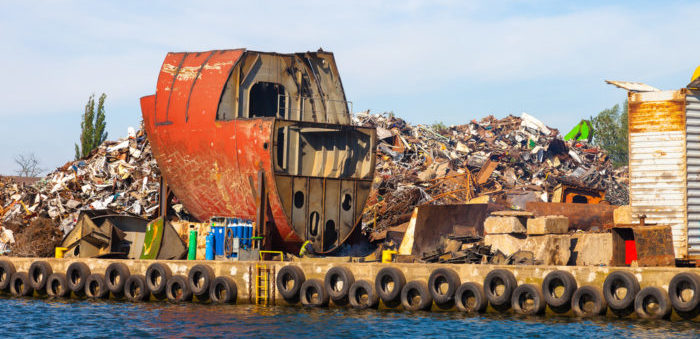The NGO Shipbreaking Platform launched its Asia quarterly update, reporting that during the first quarter of 2020, a total of 166 ships were reported, from which 126 were sold to the beaches of South Asia.
It is stated that in the period between January and March, at least 4 workers have lost their lives and at least 7 were severely injured when breaking ships in Bangladesh.
The Platform shares three incidents that took place in Asian shipbreaking yards during February to March. Specificlly, on February 3, a 27-year-old man was hit by a falling iron plate on his right leg at the Bangladeshi M.M. shipbreaking yard. The injured man currently lies in his bed at home with an open wound at high risk of infection.
In another incident which took place on February 4, a cutter man,28, died at Ziri Subedar shipbreaking yard. A week later, a 22-year-old fell from great height whilst dismantling the vessel at S.N. Corporation yard.
On March 24, two brothers died when breathing atoxic gas, while working in the engine room of the tanker West Energy, owned by South Korean company Sinokor. The vessel was beached at Kabir Steel’s Khawja shipbreaking yard.
In the first quarter of 2020, Saudi Arabian ship owners sold the most ships to South Asian yards, followed by South Korean and Greek owners.
Also, almost half of the ships sold to South Asia this quarter changed flag to the registries of Comoros, Gabon, Palau and St. Kitts and Nevis just weeks before hitting the beach. These flags are not typically used during the operational life of ships and offer ‘last voyage registration’ discounts. They are particularly popular with the middlemen that purchase vessels cash from ship owners, and are grey- and black-listed shipping registries due to their poor implementation of international maritime law.
The increased number of flag changes at end-of-life seriously compromises the effectiveness of legislation based on flag state jurisdiction only, such as the European Union (EU) Ship Recycling Regulation. Thus, the Platform reports of at least six ships that de-registered from an European flag registry prior the last voyage to South Asia in order to circumvent EU legislation.
Recently, a BBC Disclosure documentary investigation conducted by Mark Daly and Chris Foote journalists, revealed how shipbreaking activities in Alang, India caused severe harm to the environment. The disclosure pays attention to the illegally export attempt of a trio of floating rigs full of asbestos and mercury from the Scottish Cromarty Firth.






























































